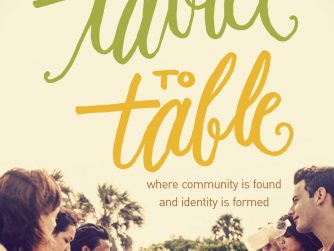I grew up in the Southern Baptist Convention. I was in an SBC church from the moment I was born in 1969 until recently. Women could teach women, or kids. They could sing in church. They could give a testimony. But preach? Nope.
Then the church brought in a female minister of music. I’m sure a few had issues with that, but for the most part, there was no issues. I didn’t think anything about it, and the church grew. She did some innovative things within that specific church, including leading the first Youth Mission tour, taking the youth choir to the inner city of Panama City, FL to work with youth and kids.
When I was in college in the late 1980’s and early 1990’s, I was active in a Baptist Campus Ministry. Every year, they had a Fall meeting and one of those years, the teacher was Molly Marshall. Marshall is currently the President of United Theological Seminary of the Twin Cities. She also taught at Southern Seminary (SBC) and Central Baptist Theological Seminary in Kansas City, KS, where she also served as president. During that weekend, she led a walk through Hebrews, and stated up front that she believed Priscilla (from Priscilla and Aqulia fame) had written the book. I almost walked out, and I essentially tuned out everything she said the rest of the weekend. I asked my campus minister about that possibility, and he said there was no real evidence that he knew of to support that. Later, when I got to New Orleans Baptist Seminary, I mentioned that to my New Testament professor, who also assured me there was little evidence that was the case.
Wait. What?
I have now discovered, even from conservative SBC’ers, that there is indeed good evidence that she may have indeed written Hebrews.
Twenty plus years later, I read New Testament scholar Scot McKnight’s ebook called, Junia Is Not Alone. I read his blog, Jesus Creed, and appreciated his scholarship and his attitude toward Scripture. In this short essay, he takes up the case for Junia, or Junias, a figure that we find mentioned in Romans 16:7. In it, McKnight points out two problems that have arisen over the centuries when discussing Junia:
- We have mistranslated her name from the feminine, Junia, to some kind of masculine form like Junias.
- We have mistranslated her role from that of apostle to either some generic messenger or communicating that the apostles saw her, along with Andronicus (presumably her husband), as only being outstanding people.
Wait. What? In it, McKnight shows that the person was, until recent translations, named an apostle. Then, when it was revealed that the name was feminine and not masculine, the person’s role was changed in many translations.
Wait. What? Are you kidding me? Let’s change the translation because we don’t like that the person is now a female?
Nijay Tells Her Story
Recently, Nijay Gupta has released a new book entitled Tell Her Story. In this book, Gupta, professor of New Testament at Northern Theological Seminary in Chicago, looks at the biblical, cultural, and historical theology of women in leadership roles within the church. He does this by looking at several women in the scriptures, including Deborah, Phoebe, Junia, Prisca (Priscilla) and others. Gupta also looks at two specific passages: 1 Timothy 2:8-15, and the household submission codes. He looks at them in context and also with an eye toward historical theology.
What I like about Gupta’s approach is that he is not trying to create some revisionist history as far as the scriptures are concerned. He notes in the introduction that he is not trying to “upend everything said or written before about the history of the early church. It is an exercise in amplification.” And he keeps his word in this book.
What you will also not see in this book is a complete re-interpretation of scripture. He doesn’t come out and say, “this verse doesn’t really mean what you think it means. It actually means…” He doesn’t come across as a flaming liberal or feminist. Neither are indicative of his work generally, nor of this book specifically. What he does do is a thoughtful excursion into historical theology, biblical interpretation, and a cultural understanding of the season during which each woman lived as well as the scripture that is being interpreted.
My Plan
I intend to look at several chapters in depth, with special interest upon Gupta’s interpretation of 1 Timothy 2:8-15, the household submission texts, and the specific women Gupta describes.
While I’m generally appreciative of the book, there are some areas where I think his argument was a little weak. I will express my concerns as I work through the chapters.
Let me say this book was one of the easiest theological and biblical books to read in a good while. This is not to diminish its rigorous scholarship in any way, because it references a broad array of biblical and theological resources. Gupta’s writing style is easy to connect with, easy to read, and clear.
So walk with me through this journey to Tell Her Story.




